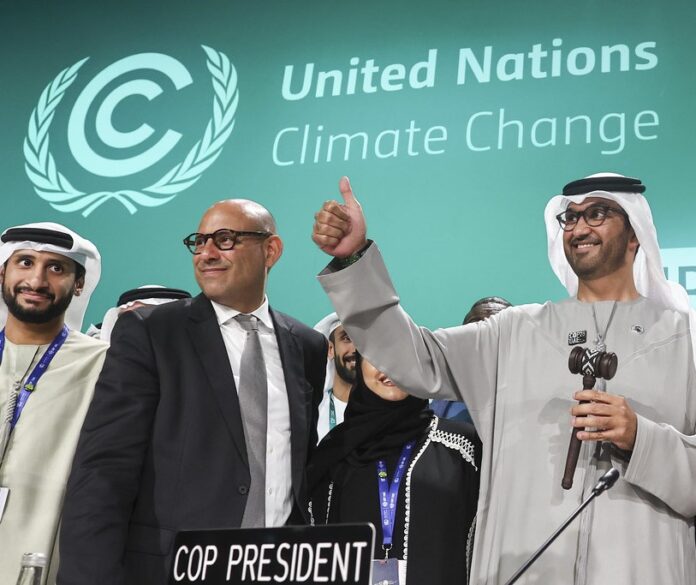The 11th hour inclusion of the phrase “Transition away from” fossil fuels marked the end of COP28. This, statement hailed by some as “historic” is at best a half-hearted victory, a baby-step at a time when a giant leap forward is needed.
Laudate Deum, Pope Francis recent Apostolic Exhortation specifically set a standard for COP 28 success. Recognising that global C02 emissions are still increasing it stated that “the necessary transition towards clean energy sources such as wind and solar energy, and the abandonment of fossil fuels, is not progressing at the necessary speed.” (55) It then says: “If there is sincere interest in making COP28 a historic event …then one can only hope for binding forms of energy transition that meet three conditions: that they be efficient, obligatory and readily monitored”. (par 59) “Transition away from” falls far short of these conditions.
It is true that “fossil fuels” were mentioned by name for the first time in a COP agreement, – in this sense it could be said that history was made in Dubai, but by the standards of Laudate Deum it was not an historic event. One commentator referred to the phrase “Transition away from” as having a “constructive ambiguity.” It is an expression of unclear intent rather than the defined commitment that is needed.
A post COP28 email received from greenfaith.org, quoted in the paragraphs below, gives the following assessment of the summit:
Most of you will have seen headlines about COP28’s concluding call for a “transition” away from fossil fuels. While such a transition is necessary, we have grave reservations about this COP’s concluding statement for three reasons.
It is not enough. The COP statement is non-binding, non-enforceable, and non-specific. There are no timetables or benchmarks. By comparison, in the face of COVID19, governments committed trillions of dollars within months. When Russia invaded Ukraine, national spending in the US and Europe surged immediately. Governments know how to act when they face a crisis which they consider a priority. In contrast, this year’s COP produced “a purely voluntary commitment by fossil fuel companies to better capture methane.” Non-binding statements and voluntary pledges are an insufficient response to any moral responsibility, let alone an existential threat.
It is not trustworthy. COP has become a venue too often used for promises made to be broken. For example, in 2009 wealthy nations pledged to commit $100 billion annually in climate finance by 2020 to assist developing countries. To date, Oxfam has reported that they have provided less than a third of that amount. Two years ago, at COP26, banks and asset managers were showered with praise for pledging to decarbonize their balance sheets by 2050. When Russia’s invasion of Ukraine caused oil and gas prices to spike, they ditched their commitment. The climate crisis requires what all our faiths require: reliable commitments, not posturing before the cameras.
It is not timely. Emissions continue to rise while tipping points draw nearer. It is widely known that nations must dramatically accelerate the transition away from fossil fuels in order to avoid temperatures surging beyond 1.5 degrees. Beyond that level, climate disasters will become so extreme that people will not be able to adapt. Basic components of the Earth system will be fundamentally, irrevocably altered. In the face of such danger, human decency requires serious deadlines. Non-specific statements designed to facilitate equivocation are immoral. (source greenfaith.org)

The views of greefaith.org representatives who attended COP28 reflect the feelings and views of many NGO’s and country representatives from the global south. The already weakened trust in the COP process has not been helped by the outcome of this Summit where once again wealthy and resource rich countries have called the shots.
Pope Francis hoped that COP28 would establish “binding forms of energy transition that meet three conditions: that they be efficient, obligatory and readily monitored”. This did not happen.
The missed opportunity of COP 28 is summed up by Anne Rasmussen, representative of the Samoan Islands, in the South Pacific where islands are disappearing because of rising sea levels. “We have made an incremental advancement over business as usual,” she said, “when what we really need is an exponential step change in our actions.”

